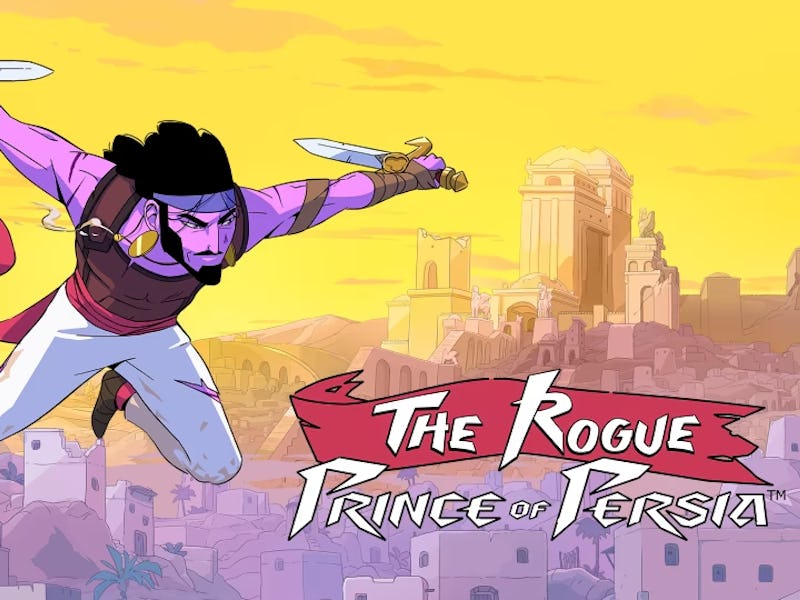Yes – Prince Of Persia Should Be Gaming’s Batman
A second Prince Of Persia game in six months is on the way and players should be all the way here for it.

In a twist no one saw coming, Ubisoft announced that a second Prince of Persia game is coming this spring. The Rogue Prince Of Persia comes from developer Evil Empire, one of the studios behind the 2018 indie darling Dead Cells, and is set to release into early access May 14.
The initial announcement was met with some confusion, especially coming barely three months after the release of Prince Of Persia: The Lost Crown. The Lost Crown had already reimagined the classic franchise in a combat-forward Metroidvania that retained challenging platforming reminiscent of the seminal 2D original. It received good to great reviews, providing a much-needed reset for a series that hadn’t seen a proper entry in 14 years. Did we really need another Prince Of Persia already?
Emphatically, the answer is yes. In fact, making the Prince Of Persia gaming’s Batman is the bold but long-overdue new direction the franchise should have taken ages ago.
When I compare the Prince to The Dark Knight himself, I’m not talking about transforming him into a brooding, borderline anti-hero (they already tried that some 20 years ago). Nor am I talking about building the platformer series into a mega-successful franchising empire, though I’m sure dozens of executives at Ubisoft wish they could crack the code on how to do so.
What I’m talking about is a willingness to let proven creatives take on the mostly malleable core tenets of what Prince Of Persia is, and allow them the freedom to do as they will.
The animated art-style of The Rogue Prince Of Persia is a refreshing take on the dormant franchise.
When you ask someone what the identifiable touchstones of Prince Of Persia are, what can they realistically say? It’s a platformer starring some kind of royal figure in distress. The protagonist should probably wield a sword at some point during his adventure. And they should save an individual or group of people from a great, maybe even supernatural peril. There aren’t exactly a whole lot of specifics beyond that.
Those are the same core strengths of why Batman is such a strong property. While the Caped Crusader has seen countless iterations, part of the appeal is seeing how one writer, director, or artist will remix those key, open-ended identifiers that have made the character such an enduring piece of American fiction. As much as wider audiences seem burnt out on the superhero genre, Batman, who’s been getting theatrical releases since 1989, is uniquely immune to this cultural apathy.
There’s a reason why in the span of five years, three distinct takes on the Batman mythos in film, 2016’s mega-stylized Batman v. Superman: Dawn Of Justice, 2017’s animated comedy Lego Batman, and 2021’s methodical detective thriller The Batman, all debuted at number one in the box office.
Lego Batman released less than a year after Zack Snyder’s take on the Dark Knight.
Even on the small screen, DC Comics had no issues airing the delightfully meta Batman: Brave and the Bold alongside the straightforward The Batman which aired between 2004 and 2008. Both of these television series co-existed with the appearances Batman made across a dozen or so excellent animated original films.
Prince Of Persia has the same potential for riveting adaptations. Ubisoft hasn’t had a clear unified vision for what this franchise should be for over a decade. Leaning into how undefined, and open-ended it is can be the most exciting thing to happen to the series in ages.
To be clear: I’m not saying Ubisoft should greenlight an endless glut of Prince of Persia games. Being judicious about who gets a shot at making a new entry will go a long way in preserving its storied legacy. And periodically, there is a benefit to letting a franchise lay dormant in order to build demand and fan excitement. But if a proven developer has a unique idea for the property or an unexplored mechanic or concept to center the character around, why deprive audiences of seeing it?
There was a period in the late 2000s when Ubisoft seemed to be going in this direction. In 2007, a full-on remake of the original PC game was released on Xbox Live Arcade. The under-appreciated open-world Prince Of Persia from 2008 was a daring cel-shaded reimagining of the series. And in 2010, a follow-up to the PlayStation 2-era trilogy was released alongside the forgotten Jake Gyllenhaal vehicle produced by Disney.
Prince Of Persia 2008 is an underrated classic.
But these were developed in-house, or based heavily on Ubisoft’s assets. In 2024, let’s go beyond and open up the floodgates to other creators. Let's see what Wayforward would do with the world of Prince of Persia. What kind of hilarity could Australian game developer Bennett Foddy do with the Prince Of Persia license? Since Microsoft and Ubisoft are cozying up, I’d love to see Rare, a master of the classic 3D platformer, take a stab at the Prince.
All of these projects can complement whatever Ubisoft creates internally. I’ll be there on day one when the long-awaited Sands Of Time remake drops. Heaven forbid Ubisoft Montpellier wants to do another imaginative Prince Of Persia game, this time in the gorgeous UbiArt engine they’re so good at utilizing.
With endless possibilities and countless studios of all sizes and backgrounds looking for work, the Prince Of Persia IP isn’t just the versatile, blank slate that gaming deserves, it’s the one it needs.